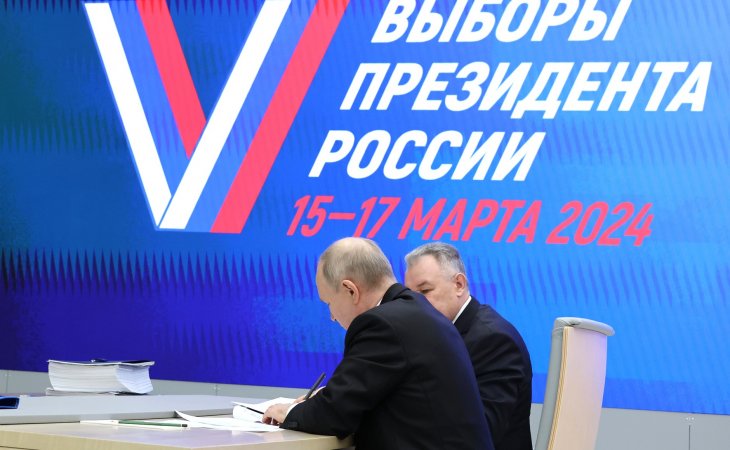This week, from March 15 to 17, Russia will hold presidential election. Canceling the elections would be entirely natural for the repressive autocratic regime that has matured in Moscow.

Vladimir Putin submitted documents to register as a self-nominated candidate for the Russian Federation presidential election. Photo: President of Russia/kremlin.ru
The government already has all the enforcement structures it needs to suppress protests. Putin could easily justify the move by arguing that Russia is a unique “state civilization” that does not need Western political models (Riddle, August 23, 2023; Valdai club, October 10, 2023).
Yet, millions of Russians will go to the polls — voluntarily or under duress — to partake in this symbolic ceremony, while millions more will cast their votes online (TASS, March 4).
The outcome is effectively predetermined, and appeals by some opposition groups to use the election to express dissent for Putin’s dictatorship will amount to little more than a statistical glitch (Novaya gazeta Europe, March 6). Alexei Navalny was the only politician who could use elections to mobilize the people, but his murder has left a hole in the opposition. For those in Russia who admired Navalny’s courage, the only opportunity to express their feelings was to bring flowers to his grave or to the hundreds of impromptu memorial sites that have popped up across the country (Re: Russia, March 5; Svoboda.org, March 6).
Putin is hardly safe from Navalny’s shadow as the exiled opposition finds new impetus for uniting their efforts and connecting with an increasingly discontented, anxious Russian populace (Moscow Times, March 4). Putin may see March as his lucky month, as he has never lost an election, dating to 2000, when Boris Yeltsin mistook him for the safest option among possible successors (Meduza.io, November 7, 2023). Putin’s understanding of history, however, is somewhat distorted. Still, he may remember that March is, in fact, a troublesome month for Russian autocrats: Emperor Paul I was overthrown by a palace coup, a revolution deposed Emperor Nicholas II, and Josef Stalin met an undignified end.
The Kremlin leader needs the elections to prove that he has broad support for the war despite his lack of interest in preserving the façade of democracy (RIAC, February 25). This election demonstration is essential for convincing a confused society that most Russians want to sustain the “heroic” effort, while the opinion polls show that a significant majority would prefer to end the war with peace talks (Levada.ru, March 5; The Insider, March 6). For many years, Kremlin courtiers have dutifully followed the creed “No Russia without Putin.” While their boss is now trying to shift it to “No Russia without war,” the real meaning of the message sounds more like “No Putin without war” (Carnegie Politika, February 29).
Meanwhile, Russia’s traditional emphasis on the massive use of manpower and firepower is losing its edge (Republic.ru, March 4). One obvious dimension of this evolution is Ukraine’s fast-progressing destruction of the Russian Black Sea Fleet through naval drones and long-range missiles (Novaya gazeta Europe, March 6). Another change is occurring in the air. Russia is increasingly losing modern Su-34 fighter aircraft, and the expected deployment of several squadrons of F-16 fighters could swing the balance in Ukraine’s favor (TopWar.ru, February 27; Focus.ua, March 3). The primary trend, however, has been driven by the gradual expansion of Europe’s military-industrial complex, while Russia’s war industry has reached its peak performance and struggles to reset supply chains constantly broken by sanctions (Moscow Times, March 6).
Putin assumes that the “long war” will preserve his regime. He insists that the only acceptable peace negotiations would be under the terms of Ukraine’s complete surrender (Nezavisimaya gazeta, March 5). Even for China, this maximalism is delusional and dangerous. As a result, Li Hui, Special Representative for Eurasian Affairs, attempted to convey Beijing’s warnings to Moscow before proceeding with his mission of exploring opportunities for selling the year-old Chinese “peace plan” in Brussels, Warsaw, and Kyiv (Kommersant, March 4). These cautious inquiries will inform Russia’s level of participation in the peace summit that Switzerland aims to hold in late spring (Republic.ru, March 6; RBC.ru, March 8). Preparations for this event, centered on promoting Ukrainian President Volodymyr Zelenskyy’s peace design, are being conducted by several international working groups, and Moscow is nervous about being excluded (Rossiyskaya gazeta, March 9).
Ukraine is making a concerted effort to include Türkiye in its peace diplomacy. Last week, during a visit to Istanbul, Zelenskyy explained to Turkish President Recep Tayyip Erdogan why Ukraine cannot engage with Russia at this stage (Izvestiya, March 8). Erdogan harbors his own ambitions for hosting peace talks while keeping close to the North Atlantic Treaty Organization’s (NATO) common stance on supporting Ukraine for “as long as it takes” and promoting military-technical cooperation with Kyiv (NV.ua, March 8; RIA-Novosti, March 9). This balancing act keeps shifting as Ankara takes steps toward greater compliance with the sanctions regime. For example, Turkish exports to Russia in February 2024 were a third less than the previous year(Forbes.ru, March 2). The curtailing of business ties has affected personal relations between the two autocrats. While Putin did call Erdogan to congratulate him on his 70th birthday, he has not yet rescheduled his postponed visit to Ankara (Izvestiya, February 26).
Putin’s international profile is damaged beyond repair. Instead of reaffirming his legitimacy, the controlled elections will further expose him as an incompetent and corrupt dictator. Assuming the role of a war leader, Putin can only rely on the same circle of servile cronies. His catastrophic blunder of invading Ukraine cannot be covered up by falsified public support for waging a long war with no end in sight. Peace remains a powerful idea, and the “elections” may emphasize the fact that Putin and peace are incompatible.
- Pavel K Baev is a Research Professor at PRIO
- This text is also published by Eurasia Daily Monitor